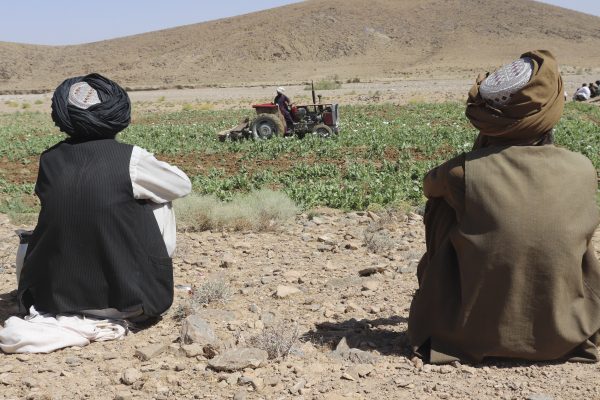
According to multiple media reports, Taliban anti-narcotics units have managed to effect a drastic reduction in opium cultivation in Afghanistan. Assisted by armed Taliban soldiers, stick-wielding personnel are hopping from one opium-growing field to another, destroying standing crops in a large number of provinces. Overseen by international media, such operations may have resulted in an almost 80 percent reduction in opium cultivation this year in the country, which not long ago accounted for 85 percent of the world’s opium. Notwithstanding the hope this has generated of significantly reducing the availability of opium in the market, sustaining the tempo may be difficult for the Taliban in the medium to long term.
These operations have followed a decree by Taliban supreme leader Haibatullah Akhundzada in April 2022 outlawing the cultivation of drugs, including opium poppy, across Afghanistan. The Taliban Interior Ministry held a news conference in Kabul to announce the order and warned, “If anyone violates the decree, the crop will be destroyed immediately and the violator will be treated according to the Sharia law.”
At that time, many doubted the sincerity of the Taliban to implement the decree, which in effect would hit the group’s own revenue generation. However, its far-reaching implementation points to the unquestionable supremacy of Akhunzada and the weight Kandahar shura carries in the decision-making of the Islamic Emirate. Other factions including the Haqqanis, who control the interior ministry, have fallen in line, at least for now.
The Taliban have made all the right noises regarding the ban, trying to showcase their ability to bring down poppy cultivation quickly, not just because it is unacceptable in Islam, but also because of their genuine responsibility to address the drug addiction epidemic in the country. Afghanistan is estimated to have at least 3.5 million drug addicts. This is somewhat ironic given the fact that the Taliban have mostly failed to govern the country in any sense of the term and have remained rooted in their regressive policies against girls and women.
The bigger question, however, is whether the ban is sustainable in the long run in an impoverished country where the number of poor has risen to 34 million in 2022 from 19 million in 2020, and where thousands of farmers depend on poppy cultivation for their livelihood. There have been reports of farmers violently protesting against the Taliban and at least one killed by Taliban soldiers. Millions spent by the international community to eradicate poppy cultivation in the country failed miserably as alternate livelihood programs either did not take off or were deemed much less profitable by the farmers.
Can the stick-wielding Taliban soldiers accomplish what the international community failed to achieve? There are genuine reasons to doubt the group’s ability to stick to its promise for long.
Similarly, whether the Taliban can expand the implementation of the decree with the same zeal in more remote provinces is another question. Operations, for now, have concentrated only in accessible provinces such as Nangarhar, Kandahar, and Helmand, under watch by some embedded journalists. The interior provinces, like as Badakhshan, have so far been free from such operations.
More importantly, it is simplistic and naive to picture the opiate economy, which according to UNODC, was estimated to be $1.8 to $2.7 billion in 2021, as so fragile as to be disrupted by a one-time crop destruction campaign in some provinces. The total value of opiates, including domestic consumption and exports, stood at between 9 to 14 percent of Afghanistan’s GDP, exceeding the value of its officially recorded licit exports of goods and services (estimated at 9 percent of GDP in 2020).
The humongous trade is run by regional and multinational cartels with complex and elaborate illicit networks across the region. Politicians, security force personnel, and even the Taliban have been part of this symbiotic nexus, profiteering enormous amounts of money. Amid the anti-poppy measures of the Taliban, a record amount of Afghan drugs moved by Pakistani and Iranian cartels, almost 2,500 kilograms of methamphetamine, were recovered in India in May 2023. Drugs sourced from Afghanistan continue to reach the African continent, Sri Lanka, Australia, and European countries. It will be simply unimaginable that all the stakeholders will bring shutters down on this trade without a fight.
The Taliban, once a willing participant in the entire drug trade, lack the wherewithal to dismantle such a mammoth network. To be successful, the Islamic Emirate of Afghanistan would need to coordinate its efforts with the regional and international community, which it has shown no intention of doing. While the Taliban, for the time being, are holding their ground in a likely effort to showcase their ability to govern the country responsibly and be responsive to international concerns regarding drugs, the achievement could very well be temporary, with the prospect of a full-scale revival of poppy cultivation looming large in the medium to long term.
The Taliban’s Unsustainable War on Drugs
Source: Frappler

0 Comments